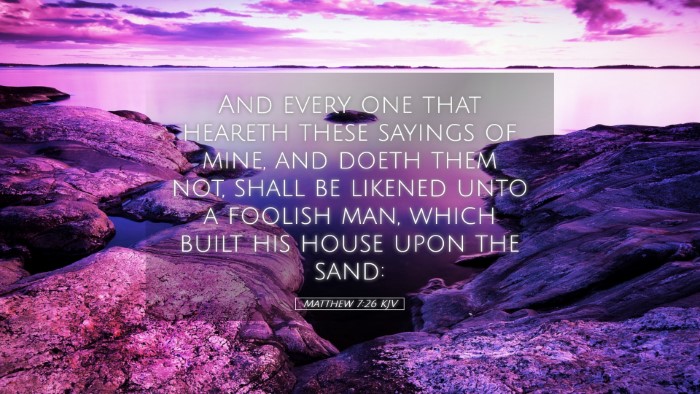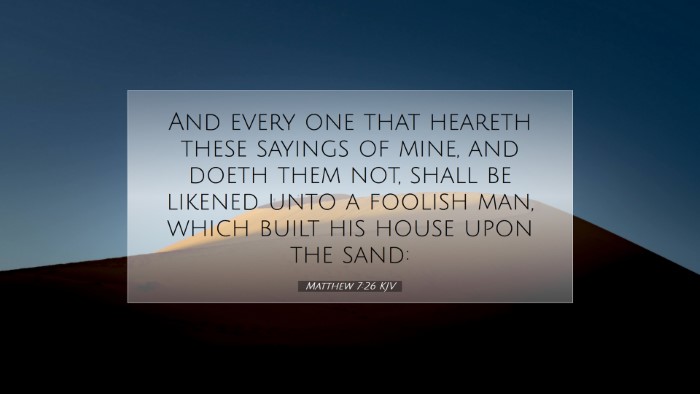Commentary on Matthew 7:26
Matthew 7:26 states:
“And everyone who hears these words of mine and does not do them will be like a foolish man who built his house on the sand.”
Introduction
This verse is a part of the conclusion to the Sermon on the Mount, emphasizing the importance of not only hearing the teachings of Jesus but also acting upon them. It serves as a stark warning against the futility of a faith that is not backed by corresponding actions. In this commentary, we will explore the insights gleaned from public domain commentaries by Matthew Henry, Albert Barnes, and Adam Clarke.
Exegesis and Analysis
1. The Nature of Hearing
Matthew Henry highlights that the act of hearing is not enough; it should lead to action. Merely receiving the teachings of Christ without application leads to spiritual danger. He emphasizes that true discipleship involves both listening and applying the doctrines taught by Christ.
2. The Comparison to a Foolish Builder
Albert Barnes notes the significance of the metaphor used in this verse. The foolish man who builds his house on the sand represents someone who neglects the foundation of his faith. In the cultural context of Jesus’ audience, the act of building on sand indicated a lack of wisdom and foresight, revealing the consequences of superficial faith.
3. The Foundation of Obedience
Adam Clarke elaborates on the foundation of the house, which signifies obedience to Christ's teachings. He insists that the teachings of Christ must penetrate the heart and mind, leading to a life that reflects His precepts. Clarke emphasizes that hearing without doing results in a faith that is not sustainable when trials come, akin to a house built on shifting sand.
Theological Implications
This verse brings forth essential theological implications that challenge both believers and theological scholars. The following points summarize crucial insights from the commentaries:
- Practical Faith: True faith must be reflected in practical actions.
- Warning Against Deception: There is a danger in self-deception when one claims to hear the words of Christ but fails to comply.
- Foundation of Life: The stability of a believer’s life is directly related to their obedience to Christ's words.
Practical Applications
The message contained in Matthew 7:26 is as relevant today as it was in the time of Jesus. Pastors, students, and scholars are encouraged to consider the following applications:
- Self-Examination: Regularly assess one's life to ensure that hearing leads to doing.
- Teach Obedience: Incorporate teachings that emphasize not just doctrine, but also application in sermons and study.
- Build Resilient Faith: Encourage believers to build on the solid foundation of Christ's teachings, preparing them for life's storms.
Conclusion
In conclusion, Matthew 7:26 serves as a profound reminder of the integral relationship between hearing and doing in the life of a believer. The insights from public domain commentaries shed light on the foolishness of neglecting Christ's teachings and the danger of a faith that lacks action. For effective ministry and spiritual growth, the challenge lies in internalizing the words of Christ and allowing them to shape the believer’s actions.


